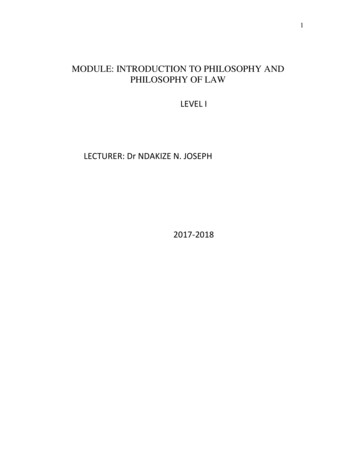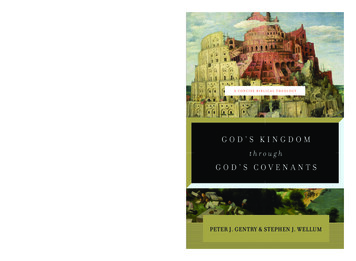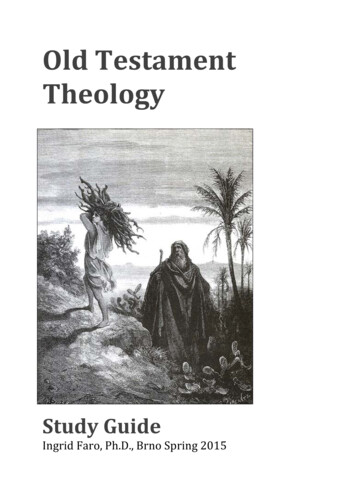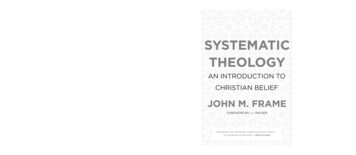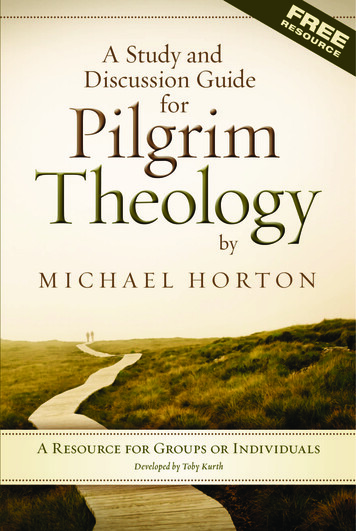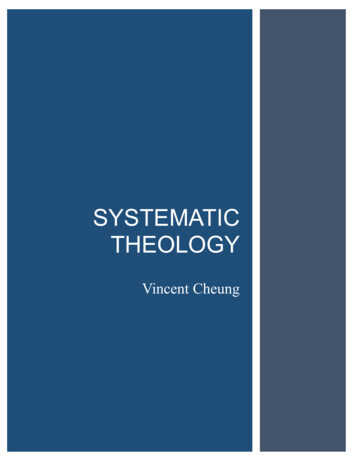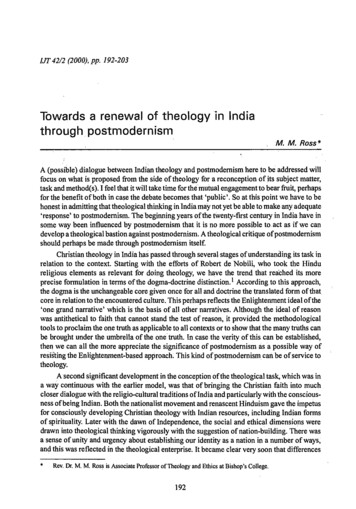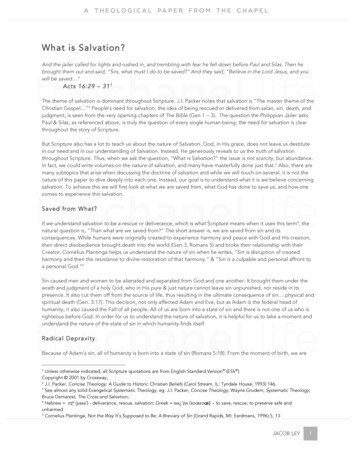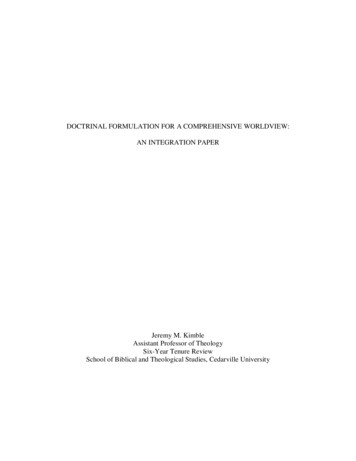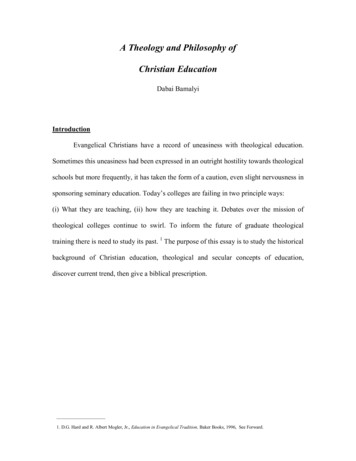
Transcription
A Theology and Philosophy ofChristian EducationDabai BamalyiIntroductionEvangelical Christians have a record of uneasiness with theological education.Sometimes this uneasiness had been expressed in an outright hostility towards theologicalschools but more frequently, it has taken the form of a caution, even slight nervousness insponsoring seminary education. Today’s colleges are failing in two principle ways:(i) What they are teaching, (ii) how they are teaching it. Debates over the mission oftheological colleges continue to swirl. To inform the future of graduate theologicaltraining there is need to study its past. 1 The purpose of this essay is to study the historicalbackground of Christian education, theological and secular concepts of education,discover current trend, then give a biblical prescription.1. D.G. Hard and R. Albert Mogler, Jr., Education in Evangelical Tradition, Baker Books, 1996, See Forward.
Historical BackgroundThe shifts in Christian education, which began in the fifth century, lasted until thebeginning of the sixteenth century. Factors that contributed to the languishing ofChristian education in the sixteenth century era: the clergy began to dominate more andmore, while the responsibility and influence of individual laity diminished. The union ofstates and church tended to eliminate high moral stands, since it erased any importantdifferences between believers and unbelievers. The “institutional” church continued toexist and even to “christianize” the barbaric tribes, but Christian education sufferedenormously. It was during this period in Europe that men like Charles the great FrankLaw, and later, Alfred of England attempted educational reforms. Due to a religiousdiversion from Biblical theology, a sort of popular theology developed that combinedChristian doctrines and superstition.2In the 11th Century, scholasticism, developed. The basic scholastic thought in theuse of reason to determine the truth of the scriptures, and ultimately to give a rationalcontent of faith, it formal beginnings are identified with St. Anselm, who tried to provethe existence of God by purely rational means. Abelard stressed the rational approach inconsidering the topical question of the 12th century, the question of universals. The earlychurch fathers notably; Augustine, incorporated Plato’s doctrines and Neo-platonicthought into Christian theology. The 13th century was marked out with the works ofAristotle. Thomas Aquinas is regarded as the greatest achievement of the scholastic ageand the ultimate triumph of the effort to “christianize Aristotle.” Too much emphasis inreason brought a shipwreck in Christian education.32.3.Eleanor Daniel, John W.Wade, Charles Gresham, Introduction to Christian Education, Standard publishing 1970, p.3From the Concise Columbia Encyclopaedia. Copyright 1991 by Columbia University Press. Sighted /ilt 4/11/2005.2
The Renaissance, beginning in the latter part of 13th century developed the concept ofnatural science which brought on the decline of scholastic metaphysics; although itapproach continued to be followed in politics and laws yet in 1879 when Pope Leo XIIIproclaimed the system of Aquinas to be the official catholic philosophy. Renaissance laidthe foundation for humanistic tradition in education. It exalted the individual, andrecovered the ancient languages and the classical literature of Greece and Rome. It was asecular movement in the main stressing the delights of living, the ideal of liberty andamong those who found Christian morality too binding a freedom from moral restains.4In early 19th century faith in scripture as an authoritative sense, revelation of Godwas discredited according to Louise Berkhof, human insight became the standard ofreligious “thought”. Men ceased to recognize the knowledge of God as something thatwas given in scriptures.5 Reason is not infallible and it must be used in line withscriptures.6 This drifting gave birth to what is known today as “postmodernism.” Theideal that there is no absolute truth is dependent on the individual. This is a clear shiftfrom the Bible.7 John Dewey (1859 - 1952). Secular educational theory and practicebegan to launch out the independent of theology, a trend best seen in John Dewey whoreduced philosophy to education theory and dismissed all theology as an obstructiveinfluence in education.8 The trends in the first quarter of the 20th century that greatlyaffected the Christian education movement are liberal and Neo-orthodox theologian.Their negative influences can be noted in seminaries, public colleges, sadly enough in thechurch.94.5.6.7.8.9.Eleanor Daniel, John W. Wade, Charles Gresham, op cit., p.39.Louis Berhof, Systematic Theology, the banner of Truth Trust, 2000, pp. 19,20Michael S.B. Reid, Strategic Level Spiritual Warfare: A Modern Mythology? Xulon press, 2002, p. 34.Eleanor Daniel, John W.Wade, Charles Gresham op cit, p.45.Shifts in curricular theory for Christian education by Peter Deboer Professor of Calvin lications/mono. 10/10/2005.What is Liberation Theology? tml 2/11/2005.3
Liberal/Neo orthodox Education:Neo-orthodox emphasise more on methods than preaching or teaching the word.Their method has to do with social gospel of feeding or clothing the poor, these methodscan never bring salvation to the souls of men. Many churches borrow these ideal becausethey are “marketable” or attract crowds but have no knowledge of the saving grace ofGod. The major challenge in Christian education is one’s theological foundation. As amatter of fact, one’s theological belief has a bearing on the person’s concept of education,especially Christian education. The liberal position is what has exposed people to biblicalcriticism, and the social gospel, leading some general positions, namely, God was seen asan impersonal or social concept. The Bible was looked upon as a source book of religiousinspiration, containing legend, myth. Christ was seen as a great man, a wonderful moralteacher, but not deity. His death was not seen as sacrificial or substitutionary. This isshare humanism.10 According to Eleanor et al; many of leaders of the religiouseducational movement accepted the liberal position in part or totally. This affected bothphilosophy and procedure of religious education. Eleanor et al further explained in theirbook, how methods were borrowed from the progressive education movement, associatedwith John Dewey, with its interest in child centeredness and the “social project”.Liberalism is what had led to the decline of the Sunday school education movement.Today, churches are substituting Christian education program, (Sunday school) withentertainment.11 It is liberalism that has led the Christian educationalist into secularism,where humanism became the content of curriculum. Simply put, liberation theology is anattempt to interpret scriptures through the plight of the poor largely with humanisticdoctrines1210. Eleanor, John W. Wade, Charles Gresham, op cit., p. 46.11. What is Liberation theology? l12. What is Neo-orthodoxy? http://www.gotquestions.org/necorthdoxy.html 2/11/2005.4
Neo-orthodoxy fundamentally differs from “orthodoxy” with its approach to thedoctrine of the “word”. The writer holds that the Bible is the revealed word of God; that itwas given by inspiration of God (2 Timothy 3:16-17; 2 Peter 1:20,21). Neo-orthodoxdenies this approach of inerrancy of inspiration. In orthodox circles, the Bible is regardedas the complete, closed and sufficient revelation of God. Neo-orthodoxy believes that theBible is a medium of revelation. (While orthodox believes it is revelation) revelation istherefore dependent on experience; making truth a mystical and not a concrete fact. Truthis therefore defined as that which is relevant to people’s experience, compared to theorthodox approach, which states that truth is concretely stated in the word of God. Truththerefore becomes relevant and not a concrete fact by which Christianity can bemeasured.13 Neo-orthodoxy further teaches that scripture is not the only form ofrevelation, but that revelation can be directly obtained from God; according to them, Godis speaking (revealing) at the present. This error had swept into most of what is called“prophetic ministry.” If the church or Bible schools etc. come to a point where theybelieve that truth is relevant to the interpretation of each individuals or ministers and thatGod is still declaring new revelation then it is sure to loose the truth.4Evangelical/Reformed EducationThe evangelicals are known by their steadfastness to the infallibility of the Holyscriptures; an evangelical is one with the unwavering believe that canonical scriptures arethe words of God. Albert et al, in their book explained that an Evangelical is one whobelieves that God acts and has acted in history, Evangelicals affirms the Lordship ofChrist and the centrality of His salvation work.13. What is Neo-orthodoxy? http://wwwgotquestions.org/neoorthdoxy.html 2/11/2005.14. D.G. Hart & R. Albert Mohler. Jr. op cit.,p 12.5
The evangelical stand against human methods that are contrary to the Bible. Theiremphases are on Bible theology no just methods, which are borrowed from philosophyand psychology. This method can never make a man of God. Only the word of God canbuild up people for God. An evangelical is one who believes in the necessity of personalexperience of grace.15The hallmark of evangelical education can be grouped into four namely: Conversionism:believing that new birth is necessary for salvation. The second is Biblicalism:- stressingthat the Bible is the infallible word of God. Thirdly, Activism:- teaches that believersmust share their faith or what they have learnt with others.16 The fought which Ireformation, stresses, that the Bible alone is the source of authority not only in Christianeducation but also in all-doctrinal matters. The reformation set forth three basic principlesthat have far reaching consequences in Christian education. The first was the replacementof papal authority with scriptures, the second was the doctrine of the priesthood of allbelievers” which stressed the individual responsibility to God and one another. And thethird, education for all. The reformers further emphasize three distinct theological tenetsthat can guide their views of education: The covenant of creation, the fall, and thecovenant of redemption. The reformers also emphasize the providence of God ineducation.1715. Ibid. p. 12.16. Vital Christianity, Warner Press, Anderson, An Assemblies of God Publication, India 46011, vol. 100. 1980,p. 1217. Robert W. Pazimino, Christian Education, Baker Books, 2001,p.7.6
Theological EducationThe apostles had only the word of God, Holy Spirit and prayer as resources forChristian education. They engaged in teaching and in prayers not just methods ofconsidering salvation is of the Lord. Biblical theology is the bedrock of Christianeducation. The Bible is the standard for the approach taken in education and the contentof Christian education. Theological education does not narrow on God’s word only but itputs other fields of discipline into consideration as revealed from the Scriptures. in otherwords, whatever people will study about God shall be that which He revealed aboutHimself in the Scriptures. (Deuteronomy 28:28).18 Theological education is not settingout to search for God but setting out to search for that which God had revealed in Hisword. Theological education may thus be conceived as a program that is designed totransform and train those called by God for ministry. Theological education is notdesigned to disengage theologians from the society but to contribute spiritually to thesociety. The goal of theological education is to lead men to Biblical concept of God as acreator, Lord, and redeemer. The aim of theological education is to reveal the Biblicalconcept of man as created in the image and likeness of God, but sinned and is in need ofsalvation. Theological education should lead persons to the Biblical concept of salvationwhich can only be obtained by grace.1918.D.G. Hart & R. Albert Mohler, Jr. op cit., p.282.19.Eleanor Daniel, John W. Wade, Charles Gresham, op cit. p. 30, 31.7
True Christian Education:Christian education is a Christ centered or God centered education carried out inhomes, churches, or schools. Christian education, as Sara Little asserts, “is a servant andnot a master of revelation.” Biblical revelation determines the educational tasks andguides the educational process since the Bible functions as the primary source and theonly inerrant criterion for the truth, all presumed facts and opinions must be tested by theword of God. An understanding of the nature of Biblical revelation has tremendousimplication for Christian education.20 According to John Wade et al, in his book:“Introduction to Christian Education”, Biblical revelation sets standards and providesbasis for all Christian education, including both the contents that are taught and themethod by which they are taught. All educational factors must be in keeping with thereality of the Bible.21 Since Christian education has to do with what we teach and how weteach it. This essay will like to quote the Bible essential to learning sited from KentHodge’s book: An Exegetical understanding of scriptures, exposure to the teachingministry, personal study, application to daily life, mentoring and the Holy Spirit.22The biggest challenge to Christian education is secularism. The recent trend isyou must own a circular degree before you can be qualified to be a pastor, namely byreading psychology to become a Christian counselor. Only the word of God can prepare aminister. Christian education that is suppose to be a channel of transmitting divine truththat was once handed down experienced a drastic shift with the advent of science on theidea of discovering new truths. Science is progressive.23 The scientist approach humanproblems from a wrong presuppositional basis.2420. John W. Wade and Charles Gresham, op cit., pp. 27 – 28.21. Ibid. p. 29.22. Kent Hodge, The Philosophy of Christian Education, All Nation for Christ Bible Institute International (ANFBII) Benin City,Nigeria, 2005, p.175.23. R.K. Campbell, Our wonderful Bible, Believers bookshelf, inc. summary, Pennsylvania, 1982, p. 222.24. Paul Cho, More than Numbers, Maranatha Foundation, 1994, 9. 135.8
Jaarma’s concept of Christian education is of vital importance according to him;education must now be redemptive. It must cultivate the individual in all his resource inkeeping with the awful reality of sin and all its tragic consequences and the saving graceof God in Christ Jesus.25 Jaarsma saw no need to limit the narrow redemptive trust ofeducation to home and church. Jaarsma explained thus, “to lead (covenant youth) to adecision for Christ is the goal of Christian education in the school as well as in thehome and the church. He said to underestimate the magnitude of this great task(redemption) by excluding it from the school as a major objective is to undermine thevery foundation of Christian education.26 Van Der Kooy noted that “the purpose ofChristian education is the whole of man’s life. education is concerned with more thanmere knowledge; the heart, too has its rights the heart above all must be won for Godand His service; the ultimate purpose in all education must be true worship (piety).27Charles Haddon SpurgeonCharles Haddon Spurgeon was a preacher of great importance Who was mightilyused of God both in theological and ministerial terms. One of his most significant workswas the pastor’s college he set up for the purpose of training ministers. As regard to theentrance of students into theological college, Spurgeon was convinced that no manshould be accepted for training unless actually called by God to preach.25. Shifts in Curricular Theory in Christian Education, by Peter De Boer professor of Calvin ews/publications/mono. 10/10/2005.26. Shifts in Curricular Theory in Christian Education, by Peter De Boer professor of Calvin ews/publications/mono. 10/10/2005.27. Shifts in Curricular Theory in Christian Education, by Peter De Boer professor of Calvin ews/publications/mono. 10/10/2005.9
That is to say ministerial education is more of calling and election. Curriculum oftheological training, Spurgeon asserted the place of prime importance should be given to“Biblical Theology”. Contrary to the modern day trend on education of allowing studentsdecide for themselves that which is right or wrong, Spurgeon differed from so many ofhis contemporaries (and or) with regard to manners in which students should be trained.Instruction, he maintained, should be given in definite, dogmatic form. Tutors should notteach their students in broad liberal manner which presents number of “view points” andleaves the ultimate choice to the student; rather they should forcibly and unmistakablydeclare the mind of God 28 Though he stood practically alone in this conviction,Spurgeon was ready to declare it in no uncertain terms: “that men seek no collegiatedegrees or classical honours though many of them could readily attain them; but topreach efficiently, to get at the heart of the masses, to evangelise the poor. This is the aimof pastor’s college.” Spurgeon further explained, “let the world educate their men for itsown purposes, and let the church instruct men for its special service.” The basis of hisChristian education was to help men set forth the truth of God, expound the scriptures,win sinners, and edify the saints. 29E.W. Kenyon:E.W. Kenyon was an evangelist and a teacher who established a bible school in1900. His Bible school grew out of a desire to see many who are called into the ministrytrained to bring in the harvest of lost souls at home and broad into God’s kingdom.28. C.H. Spurgeon, An All Round Ministry, Banner of Trust, 2000, see introduction.29. C.H. Spurgeon, op cit., introduction.10
Nothing explains Kenyon’s Basis like in the following statements; “Bethel is not a placefor those who put worldly knowledge , before daily living the word of God.” Greatenthusiasm and joy comes at the new birth, Kenyon wrote, “but unless that is cared forand fed by the mind being renewed through feeding on the word and practicing it, thatjoy will die out. To Kenyon, education is for a living not mere feeding the brain. 30Traditional ModelThis model shows how educational theories can be described as addressing one ofthe major domain of human nature and how their domain interface. The domains arephysical, mental, social – emotional, and spiritual.31 The physical domain theoristsprimarily address the aspect of one’s physical existence, aging, growth, development, andresult behaviour. The social-emotional domain theorists primarily address the interactionwith self and others. Its major focus is on id, ego and super ego. The integrative domaintheorists addresses a combination of aspects from the four domains that reflect the humanexistence. Example of this theory is Maslow theory hierarchy of needs which includes:cognitive, psychological, and spiritual. 32 The author, in his view, states that a careful lookat the fundamental theories that form the basis for secular education is nothing but a sortof philosophy and psychology which should bit be used in training ministers of God.A.N. Triton speaks on the problems of human philosophy: philosophical “lust” forintellectual tidiness and do not always realize that it is not a theological virtue.” 33 Themajor weakness of these theories is not only humanism but their neglect of spiritualtheory, which has to do with divine truths rooted in the word of God. 3430. Joe Mclntyre, E.W. Kenyon: The True Story, Evangel Publication, Nigeria, 1982, pp.118,19931. Education Theory Handbook: http://www.theshop.net/aboatman/edtheory.htm 23/8/200532. Education Theory Handbook: http://www.theshop.net/aboatman/edtheory.htm 23/8/2005.33. A.N. Triton, Whose World? Inter-varsity press, 1972,p.3034 Education Theory htm 23/8/2005.11
Traditional ParadigmTraditional paradigm developed its concept of innate knowledge, this waspropagated by Plato saying; “Knowledge originate from the inside of a man’s mind.”Those who are swept with this idea live their students with the concept that you need noone to teach you. All you need is “think” and know. In contradiction to this theory,Aristotle who argued that knowledge is acquired from outside. Although both theoriespresent some iota of truth, Norman Dejong emphasizes that “such a perspective is ashallow kind of endeavour with no room allowed for discernment between truth andfalsehood, no room for character development and spiritual nourishment. People whopropagate that knowledge are acquired only from outside to hinder their student frombeing committed in searching to know the truth. This will limit their God given gifts.Norman says, “The truth lies somewhere in between the two views.” 35Current TrendBrad Macdonald comments on the ailing state of universities, “today’s universitieseducate tomorrow’s leaders. By looking at the present state of higher education, wecan glimpse the nation’s fortune.” 36 College campuses have become the virulent breedingground for destructive thoughts. The corridors of today’s universities are thick with anatmosphere of immorality, moral ambiguity and rabid secularism. Unless radical changesoccur soon, this facet of modern education will thrust greater troubles upon mankind, 37 Today’s Colleges are failing in two primary ways (1) What they are teaching and (2)How they are teaching it. 3835.36.37.38.Norman Dejong, Teaching for a Change: A transformational approach to education, p & R, 2002, p. 54.5.The Philadelphia Trumpet Magazine, Teen Spirit, the Main Streaming of Youth Counter Culture, 2005, p.28.The Philadelphia Trumpet Magazine, op cit., p. 28.Ibid, p. 28.12
Across America, liberal professors outnumber conservatives five to one (liberalprofessors 72% while conservatives 15%). A collection of some of the strange classesyou can take at America’s most prestigious colleges and Universities: Philosophy andStar Trek Georgetown University. How to be gay: male homosexuality and InitiationUniversity of Michigan. Witchcraft and Politics Bucknell University. Taking Marxseriously: Amherst College. Black Marxism U.C – Santa Barbara. Interpreting the Queerpast UC – Berkeley. The media and Aggression against Women UCLA. PracticingFeminism: A Study of Political Activism: William College. Feminist BiblicalInterpretation: Harvard. Backgrounds of Homoerotic Literature: Rutgers. 39RelativismThis has to do with the concept that nothing can be understood in isolation.Everything exist in some kind of context, which necessitated seeing things in relationshipto something else in other to understand them. 40 To a Relativist, everything is relative,nothing is absolute. According to Norman Dejong, “For the relativists to insist absolutelythat there are no absolutes is for them to put an absolute, thus, contradicting their ownclaim.” 41 Russ Wise in his write up, Education and New Age Humanism explained theidea of relativism: the basis for developing morals is what the child himself wants tothink and/or what the peer group decides is right, strong conviction of right and wrongsare looked upon as evidence of poor social adjustment and need for the teachers’ therapy.The bottom line is this; the major consensus determines what is right or wrong at anypoint in our culture. There are no absolutes. 4239. Ibid, p. 30.40. Norman, op cit., p. 34.41. Ibid, p. 3442. Russ wise, Education and New Age Humanism. http://www.leader u.com/orgs/probe/does/nwageed.html 10/3/2005.13
It is this concept that had given birth to what is known today as moral relativism. 43 Moralrelativism is the belief that defining right and wrong is an individual and personal choice.Denying the presence pf absolute law, this ideology teaches that every decision is a materof personal feeling.44 Modern day education is driven by culture. Nduka (1964) seeseducation as culture. He says, “education is our way of life and the process oftransmitting, advancing and consolidating culture.”45 The further purpose foreducationalist is to “instill traditional values in young people” this is a clearer shift fromBiblical theology which is meant to be the foundation for education.46 Christianeducation had missed the ultimate goal of education as they had borrowed principles ofeducation from sources such as reason (and) experience; secular principles. These seculareducational principles are built on unscriptural philosophical bases such as pragmatism,empiricism, and naturalism.47The early missionary who brought schools to Africa,Nigeria in particular saw education (schools) as a tool for evangelism (soul winning)training for godliness and the betterment of the society. 48 Today, the reverse is the case.The society determines what education should be. 49 No wonder there is an alarming cryby experts that educational standards have fallen. The schools are only producing halfbaked graduates. 5043. The Philadelphia Trumpet Magazine, op cit., p. 21.44. Ibid, p.31.45. A.D. Nzemeke nd E.O. Erhagbe, Nigerian Peoples and Culture, (Second Edition), Mindex Publishing Department of History,University of Benin, Nigeria, 2002, p.760.46. Nzemeke and E.O. Erhagbe. Op cit., p. 76.47. Ibid, p. 124.48. James S. Coleman, Nigeria Background to Nationalism, Broburg and Wistrom Benin City,Kathrineholm, 1986, pp. 173,114.49. A.D. Nzemeke and E.O. Erhagbe, op cit., pp. 77 & 88.50. Nigeria Television Authority (NTA) news, 2005.14
Biblical prescriptions:There is need for educational reforms so as to check out for all the secularism,humanism, which had crept into the modern day Christian education. There is need to goback to the Bible as the only source of authority in Christian education. It is good forchurches to influence secular education in the world. Christians should be involved withcolleges and universities and influence the content of curriculum and impact society.Christians should be careful not to baptize secular teachings and use them in Bible institutesto training pastors.51for the betterment of education, there is need to have an importantlinkage between church and schools. Penile academy is closely linked with Penile church andmany church attenders had also attended the academy. Many of the children and youngpeople a re currently attending. The re-enforcement of teaching between church and schoolsenable yet a firm belief system to develop. 52 Church of God Mission International had addedfellowship in their school curriculum as a means of teaching God’s word, and training herstudent for godliness. 53Post Modernism, the idea that each person’s view is as good as others, “education”by discussion and democracy is preferred in the class. The teacher serves as a guide to the“student” discovering himself, rather than an instructor in a body of knowledge. 54 However,the author concurred with the methods of C.H. Spurgeon who “ differed from so many ofhis contemporaries (and ours) with regards to the manner in which students should be trained.Instruction, he maintained should be given in definite, dogmatic form. Tutors should notteach their students in that broad, liberal manner, which presents a number of view-points andleaves the ultimate choice to the student; rather they should forcibly and unmistakablydeclare the mind of God and show a determined predilection for the Biblical theology. 5551. Kent Hodge, Pentecostal theology, printed for All Nations for Christ Bible Institute International byAssociates, Benin city. Nigeria. Nd, pp. 237 – 238.52. Michael SB Reid. Op cit., p. 26.53. Benson Idahosa Group of Schools, Benin City, Nigeria (B.I.U).54. Kent Hodge, op cit., pp. 174 – 175).55. C.H. Spurgeon, An All Round Ministry, the Banner of Truth Trust, 2000, Introduction.15Gift. Prints
There is need for proper knowledge of the truth. As Wayne Grudem states:I am convinced that there is an urgent need in the churchdoctrine, or systematic theology. Not only pastors andteachers need to understand theology in greater depth – thewhole church does as well one day by God’s grace wemay have churches full of Christians who can discuss,apply and live the doctrine teachings of the Bible as richlyas they can discuss the details of their jobs or hobbies Once that happens, I think that many Christians will findthat understanding (and living) the doctrines of scripture isone of greatest joy. 56Contrary to humanism, the author recommends a Christ centered education. BecauseChristian education is transmission of content which is a major priority in a philosophy ofChristian education, the content must be scripture-oriented and central theme of scriptureand his redemptive work. A Christ centered education focusing on a Biblical Christ andHis finished work, for redemption help prevent theological syncretism with naturalsources of epistemology and maintain objectivity in educational content. 57Calling and ElectionThe most common New Testament reference to election is God’s eternal electionof certain persons to salvation Jesus Christ. The subject is dealt with comprehensively inEph. 1:3-11 and Rom. 8:28 – 11:36. John Calvin, who became a major defender of thereformed doctrine, saw the whole doctrine of election summarized in Eph. 1. All thereformed confessions include divine election Election is part of God’s eternal decreeand it has a soteriological role: “that some in time are given faith by God and that othersare not given
Robert W. Pazimino, Christian Education, Baker Books, 2001,p.7. 7 Theological Education The apostles had only the word of God, Holy Spirit and prayer as resources for Christian education. They engaged in teaching and in prayers not just methods of considering salvation is o
